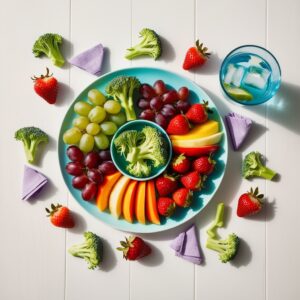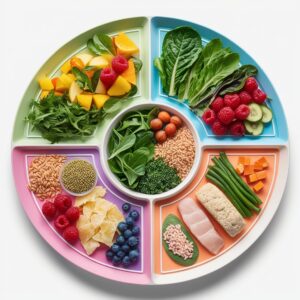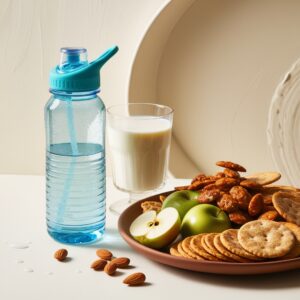Nutrition in toddlerhood is crucial because it forms a lifelong pattern of eating. A diet initiated early in life will carry over to prevent stunted growth, boost immunity, and create a positive attitude toward food. Parents do face challenges in providing a proper diet for their toddlers because they are often picky eaters. This guide will outline practical tips and strategies to help parents build healthy eating habits for their toddlers.
1. Why Nutrition for Toddlers Matters
Between the ages of one and three, children grow and develop rapidly. Their nutrition is specialized and different from others.

Key Benefits of a Balanced Toddler Diet
- Growth and Development: Good nutrition helps with the development of bones, brains, and muscles.
- Enhancing Immunity: A diet rich in vitamins and minerals wards off diseases.
- Establishment of Healthy Behavior: Good foods introduced early in life minimize the tendency towards unhealthy eating habits later in life.
2. Key Nutrients for Toddlers
A well-rounded diet encompasses a wide variety of food groups, which forms the basis of the child’s nutritional needs.

Key Nutrients and Their Foods
- Protein: For growth and building.
– Lean meat, fish, eggs, beans, and milk are some of the sources. - Calcium: Builds strong bones and teeth.
– Sources: Milk, cheese, yogurt, and fortified plant-based milks. - Iron: Prevents anemia and carries energy.
– Sources include lentils, spinach, red meat, and fortified cereals. - Healthy Fats: Very important for the child’s brain development
– Sources: Avocado, nuts, seeds, and olive oil. - Fiber: Keeps digestions running well and helps prevent constipation.
– Sources: whole grains, fruits, and vegetables.
3. Practical Tips for Building Healthy Eating Habits
Teaching good eating habits calls for patience, creativity, and also consistency.
1. Provide a Range of Different Foods
Expose your toddler to various tastes, textures, and colors. This makes mealtimes more fun while developing their palate.
2. Do Not Battle Over Food
Children who are forced to eat develop a negative association with food. Encourage, but do not force, them to try new foods.
3. Positive Example
Toddlers often imitate their parents. Eat healthy, nutritious foods yourself as a good example for your child.
4. Schedule Regular Meals
Having regular meal and snack times helps control hunger and avoids overindulgence in less-than-healthy snacks.
5. Limit Processed Foods
Limit sweet treats, beverages, and processed food. Instead, choose whole, natural foods such as fruits, yogurt, and homemade bars.

4. Solving Common Challenges
Feeding toddlers doesn’t always run in an orderly fashion. Here are some tips to address certain common problems:
Fussy Eating
- For picky eaters, serve a small amount of new food along with their favorite food.
- It may require multiple tries before a toddler will accept a new cuisine, so exercise patience.
Food Refusal
- Try creative presentations, such as cutting fruits into fun shapes.
- Serve the same food in different ways; for example, raw carrots versus cooked carrots.
Slow Eaters
- Set reasonable time limits for meals to prevent extended eating sessions.
- Do not allow distractions, such as toys or screens, at the table.
Allergies
- Gradually introduce common allergens, such as peanuts and eggs, according to pediatric guidelines.
- A doctor should always be consulted if an allergy is suspected.
5. Promoting Healthy Drinks
What your toddler drinks is equally important as what they eat.
Recommended Beverages
- Water: Ideal for hydration.
- Milk: Supplies calcium and vitamin D; however, it should not exceed 16–24 ounces per day.
- Fruit Juice: Should be given in a limited amount of up to 4 ounces daily and should contain 100% juice, without added sugar.
Drinks to Avoid
- Sugary drinks, like sodas and flavored milks.
- Caffeinated beverages, which could cause sleeping disorders and restlessness.

6. Making Mealtime Fun
Turn mealtimes into enjoyable experiences so that food will not be a bad thing in your child’s mind.
Involve Your Toddler
- Give them some small tasks, like washing fruits or stirring batter.
- Use toddler-sized utensils to make eating easier.
Make It Interactive
- Prepare themed meals, such as “Rainbow Day” with foods of different colors.
- Use engaging tools, such as cookie cutters, to make fun food shapes.
7. Long-Term Impact of Healthy Habits
The habits you develop in toddlerhood lay the groundwork for a lifetime of health and wellness. Positive experiences with food now set the stage for healthier eating patterns in later adolescence and adulthood.
It is gratifying to set eating healthily during the toddler years since all goes down to the growth, health, and relationship your child develops with food. With patience, creativity, and an eye on balance, you’ll be able to provide your toddler with what they need nutritionally while instilling habits that will last a lifetime.
Do little, be consistent, and celebrate every tiny achievement since every healthy bite today is the promise of a healthier tomorrow.



